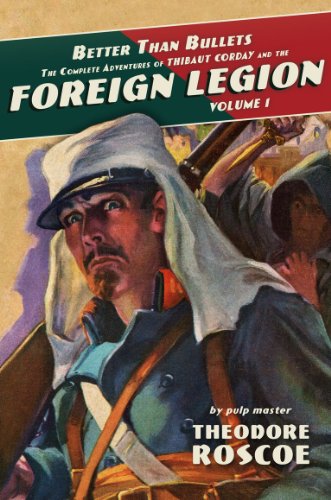 Queer things happen to the Foreign Legion in Africa; but the maddest affair of them all was that naval battle in the Red Sea.
Queer things happen to the Foreign Legion in Africa; but the maddest affair of them all was that naval battle in the Red Sea.
In the cafes of Algiers, an old legionnaire with a cinnamon-colored beard holds court, telling all who pass by his classic old soldiers’ tales. Today, however, old Thibaut Corday’s humor is gone. Today, the old soldier is spooked by a puppet play outside of a mosque. Today, as long suppressed memories of the strangest parts of Africa come roaring back, old Corday unearths the story of the Death Watch.
Old soldiers may never die, but it is a shame that Theodore Roscoe’s tales of Thibaut Corday have, for most folks, faded away. Roscoe brings a relish to the old Frenchman’s tales, mixing the once best-selling legionnaire genre with a kind of naturalistic weird tale. And in “The Death Watch”, Roscoe and Corday blend into this mix the misdirection and stage magic that would fascinate so many pulp authors in the 1930s and beyond. But magic is magic, stage or otherwise, and it is treated with the same caution as a swordsman would treat sorcery or a handler his snake. Even if Corday eventually lets his audience peek behind the curtain.
But before we get ahead of ourselves, lets run the story back to its source, a strange Yankee recruit known as Jack the Goat. A man who is an outcast even among the outcasts of the Foreign Legion. A man whose valor old Corday never doubts.
From the first I liked the odd little Yankee; though I could not help him to conquer his unkindly comrades, save by giving advice. In the Legion a man must fight his own battles.
But there are worse things to fight than one’s own comrades along the rivers of Africa, and when the Legion’s lieutenant is murdered on The Flower of France, the Legionnaire aboard finds itself on the wrong side of an indigenous mutiny. Worse still, the captain sent to replace him has brought both his wife and a jealous eye along. As the martinet’s pride pours gasoline on the fire, Corday and his men must extinguish the mutiny and bring the scared women home safely. As the enemy sweep over the ship, only one man remains between the mutineers and the captain’s wife: Jack the Goat.
One has to forgive old Corday his absence here, as the Legionnaire is racing to Eritrea to raise a relief column from the Legion outpost there. But he returns to the Flower of France to witness a miracle–the deceased Jack the Goat and his dead squad mates fending off frightened mutineers. This watch of the dead prevailed for many days. How Jack managed this feat and the reasons why I will leave to the old legionnaire’s explanation, save for one aspect. In the Legion, every man has a history, even a short little Yankee driven to join the Army of the Damned.
“The Death Watch” is a quick and action-packed read, and an honest one as well. Veterans recognize the little trip-ups, mistakes, and catastrophes that litter the battlefield. And Corday minimizes his own involvement to praise the valor of Jack the Goat. There is a wary respect for the mutineers, even as the legionnaires fight to prevent them from acting on their most base instincts. And if the story behind the story relies heavily on coincidence and chance meeting, it is not the first to do so, and the coincidence only heightens the eeriness of this most naturalistic of weird tales.
And once Courday pays homage to a fallen comrade’s valor, the legionaire’s humor slowly returns. The Army of the Damned will march again into even stranger parts of Africa. But that will be a tale for another day.
I’ve read P.C. Wren’s stories of the Legion and enjoyed them immensely. I need to give Theodore Roscoe’s stories a look.